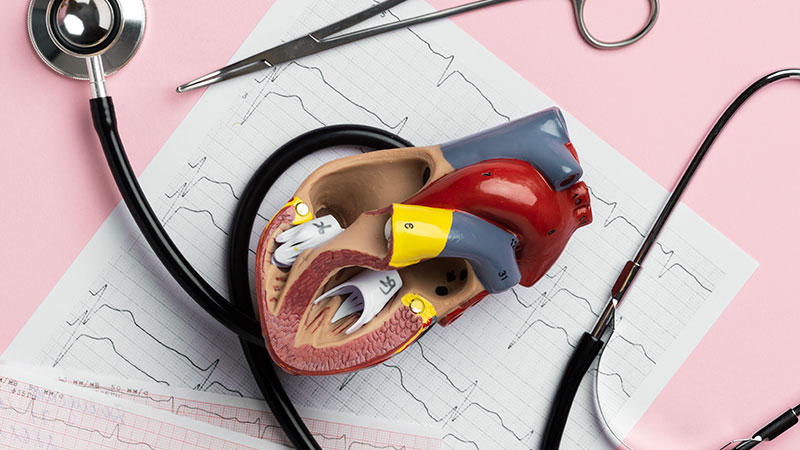Have you ever wondered if dehydration can cause heart palpitations? The answer is yes. Dehydration, often underestimated in its impact, can disrupt the delicate balance of fluids and electrolytes essential for the heart’s proper function.
When the body loses more fluids than it takes in, whether due to insufficient water intake, excessive sweating, or illnesses like diarrhea, it can lead to electrolyte imbalances, notably potassium and magnesium.
These electrolytes play critical roles in regulating the heart’s electrical impulses and muscle contractions.
As dehydration progresses, the heart may compensate by beating irregularly or more forcefully, resulting in palpitations. Understanding the connection between hydration status and heart health is crucial for preventing such symptoms and maintaining overall well-being.
This blog explores in depth how dehydration triggers palpitations, signs to watch for, and strategies to effectively manage and prevent this common yet often overlooked issue. So, stay focused.

What is Dehydration?
Dehydration occurs when the body loses more fluids than it takes in, disrupting the balance of essential minerals and fluids necessary for proper function.
This condition can result from inadequate fluid intake, excessive sweating, diarrhea, vomiting, or certain medical conditions like diabetes. Symptoms typically include thirst, dry mouth, dark urine, fatigue, dizziness, and in severe cases, confusion or fainting.
Dehydration can affect anyone but is particularly dangerous for young children, older adults, and individuals with chronic illnesses. Prompt treatment involves replenishing fluids and electrolytes through oral rehydration solutions or, in severe cases, intravenous fluids.
Prevention includes staying hydrated, especially in hot weather or during physical activity, and monitoring fluid intake, particularly for vulnerable populations.
Recognizing the signs early and taking appropriate measures are crucial to preventing complications associated with dehydration.
What Are Heart Palpitations?

Heart palpitations refer to sensations of irregular, rapid, or pounding heartbeats. These feelings can range from fluttering or skipped beats to a sensation of the heart pounding in the chest. Palpitations often occur due to harmless causes like stress, anxiety, caffeine intake, or strenuous exercise.
However, they can also signal underlying heart conditions such as arrhythmias (abnormal heart rhythms), heart valve problems, or thyroid disorders. Symptoms associated with palpitations include dizziness, shortness of breath, chest pain, and fainting in severe cases.
Diagnosis typically involves a physical exam, review of medical history, and sometimes tests like electrocardiogram (ECG) or Holter monitoring to record heart activity over time.
Treatment depends on the underlying cause, ranging from lifestyle changes and stress management techniques to medications or procedures to regulate heart rhythm. It’s important to seek medical evaluation if palpitations are persistent, severe, or accompanied by other concerning symptoms.
Can Dehydration Cause Heart Palpitations
Here’s an elaboration on how dehydration can cause heart palpitations, broken down into several points with detailed explanations:
Mechanism of Dehydration and Heart Palpitations
Dehydration occurs when the body loses more fluid than it takes in, leading to an imbalance in electrolytes like potassium and sodium, which are crucial for maintaining normal heart function.
When dehydration sets in, the blood volume decreases, and the concentration of electrolytes in the blood can become too high. This imbalance can directly affect the heart’s electrical system, potentially leading to irregular heartbeats or palpitations.
Dehydration-induced electrolyte imbalances, particularly low potassium levels (hypokalemia) or low magnesium levels (hypomagnesemia), can disrupt the normal electrical impulses that coordinate the heart’s contractions.
Potassium, for instance, plays a vital role in regulating the heart’s rhythm by facilitating the movement of electrical signals that control muscle contractions. When potassium levels drop due to dehydration, this can lead to abnormal heart rhythms, including palpitations.
Impact of Fluid Loss on Heart Function
The heart relies on adequate fluid intake to maintain a consistent blood volume and pressure necessary for efficient circulation. When dehydration occurs, blood volume decreases, and the heart has to work harder to pump blood throughout the body.
This increased workload can manifest as palpitations, as the heart tries to compensate for the reduced blood volume by beating faster or irregularly.
In cases of severe dehydration, the lack of sufficient fluid can lead to hypovolemic shock, a condition where there is not enough blood circulating to meet the body’s needs.
This severe form of dehydration can cause a significant decrease in blood pressure and oxygen delivery to tissues, triggering palpitations as the heart struggles to maintain adequate circulation.
Role of Stress Hormones in Dehydration
Dehydration triggers the release of stress hormones like cortisol and adrenaline, which are part of the body’s response to fluid imbalance. These hormones can stimulate the heart to beat faster and harder, leading to palpitations.
Additionally, dehydration-induced stress can exacerbate underlying cardiovascular conditions, making individuals more susceptible to palpitations even in the absence of electrolyte imbalances.
The combination of physiological stress from dehydration and the direct effects of electrolyte disturbances can create a perfect storm for palpitations.
For example, dehydration-induced electrolyte imbalances may trigger palpitations in individuals with underlying heart conditions, such as arrhythmias or structural heart problems, by exacerbating their existing vulnerabilities.
Symptoms and Recognition of Dehydration-Induced Palpitations
Recognizing the symptoms of dehydration-induced palpitations is crucial for timely intervention. Symptoms may include a fluttering sensation in the chest, a rapid or irregular heartbeat, or a pounding sensation that feels stronger than usual.
Some individuals may also experience dizziness, lightheadedness, fatigue, or shortness of breath along with palpitations. It’s important to differentiate dehydration-induced palpitations from other causes.
For instance, palpitations due to dehydration often occur in the context of reduced fluid intake, excessive sweating (such as during intense physical activity), or illnesses like diarrhea or vomiting that lead to fluid loss.
Understanding the circumstances surrounding palpitations can help in identifying dehydration as a potential cause.
Diagnosis and Treatment of Dehydration-Induced Palpitations
Diagnosing dehydration as the cause of palpitations involves assessing the individual’s fluid intake, recent activity levels, and symptoms. A physical examination may reveal signs of dehydration, such as dry mouth, decreased urine output, or low blood pressure.
Laboratory tests, including blood tests to measure electrolyte levels and kidney function, can help confirm dehydration and identify any associated electrolyte imbalances.
Treatment of dehydration-induced palpitations focuses on correcting fluid and electrolyte imbalances. Mild cases may be managed by increasing fluid intake orally and consuming electrolyte-rich fluids or oral rehydration solutions.
In more severe cases, intravenous fluids may be necessary to rapidly restore fluid balance and correct electrolyte deficiencies.
Preventive measures are essential to avoid dehydration-induced palpitations. This includes staying adequately hydrated by drinking water regularly, especially during hot weather or when engaging in strenuous activities.
Monitoring fluid intake and recognizing early signs of dehydration, such as thirst or dark urine, can help prevent electrolyte imbalances and associated palpitations.
Long-Term Implications and Prevention Strategies
Chronic dehydration can have long-term implications for heart health. Prolonged fluid imbalance and electrolyte disturbances may contribute to the development or exacerbation of cardiovascular conditions, including hypertension or arrhythmias.
Therefore, maintaining proper hydration levels through consistent fluid intake is crucial for overall cardiovascular health and reducing the risk of dehydration-related palpitations.
Educational efforts are important to raise awareness about the link between dehydration and heart palpitations.
Encouraging individuals to recognize the signs and symptoms of dehydration, such as thirst, dry mouth, or fatigue, can empower them to take proactive steps to maintain adequate hydration.
Providing information on the importance of electrolyte balance and strategies for staying hydrated can help prevent dehydration-induced palpitations and promote overall well-being.
Dehydration can indeed cause heart palpitations through various mechanisms, including electrolyte imbalances, increased cardiac workload, and the release of stress hormones.
How to Manage Dehydration-Induced Heart Palpitations
Managing dehydration-induced heart palpitations involves addressing both the underlying dehydration and the resulting electrolyte imbalances. Here are several effective strategies:
1. Rehydrate Promptly

The first step in managing dehydration-induced palpitations is to replenish lost fluids by drinking water or electrolyte-rich beverages. Oral rehydration solutions, available over-the-counter, are particularly effective in restoring electrolyte balance.
2. Monitor Fluid Intake

Maintain a consistent intake of fluids throughout the day, especially during periods of increased fluid loss such as hot weather or physical exertion.
Monitoring urine color can provide a quick indicator of hydration status; pale yellow urine suggests adequate hydration, while darker urine may indicate dehydration.
3. Consume Electrolytes

In addition to fluids, consume foods or drinks rich in electrolytes like potassium (bananas, oranges) and magnesium (nuts, seeds) to help restore electrolyte balance and support normal heart function.
4. Avoid Caffeine and Alcohol

Both caffeine and alcohol can contribute to dehydration and exacerbate palpitations. Limiting or avoiding these substances can help prevent further fluid loss and reduce the likelihood of palpitations.
5. Rest and Relaxation

Stress and fatigue can worsen palpitations. Practice relaxation techniques such as deep breathing, meditation, or gentle yoga to reduce stress levels and promote overall relaxation.
6. Seek Medical Evaluation

If palpitations persist despite rehydration efforts or are accompanied by severe symptoms like chest pain, shortness of breath, or fainting, seek medical evaluation promptly. A healthcare provider can assess for underlying conditions and recommend appropriate treatment.
7. Gradual Return to Activity

After experiencing dehydration-induced palpitations, gradually resume physical activities to avoid overexertion. Pay attention to hydration levels during exercise and take breaks as needed to rehydrate.
By implementing these strategies, individuals can effectively manage dehydration-induced heart palpitations, restore fluid and electrolyte balance, and reduce the risk of recurrence.
Consistent hydration and proactive management of fluid intake are key to maintaining heart health and overall well-being.
When to Seek Medical Help for Dehydration-Induced Heart Palpitations
Knowing when to seek medical help for dehydration-induced heart palpitations is crucial to prevent complications and ensure appropriate treatment. Here are several key signs and situations that warrant seeking medical attention:
Persistent Palpitations
If palpitations continue despite efforts to rehydrate and rest, it’s important to consult a healthcare provider. Persistent palpitations may indicate underlying heart rhythm disturbances that require medical evaluation and management.
Severe Symptoms
Seek immediate medical attention if palpitations are accompanied by severe symptoms such as chest pain, shortness of breath, dizziness, fainting, or confusion. These could indicate a more serious underlying condition or complications of severe dehydration.
Palpitations with Known Heart Conditions
Individuals with pre-existing heart conditions, such as arrhythmias or structural heart problems, should be vigilant about any changes in heart rhythm, including palpitations. Consulting a cardiologist or healthcare provider for evaluation and management is essential.
Electrolyte Imbalance Signs
If dehydration is severe enough to cause electrolyte imbalances, additional symptoms may include muscle weakness, cramping, nausea, or changes in mental status. These signs indicate a more advanced stage of dehydration requiring medical intervention.
Inability to Keep Fluids Down
If dehydration is accompanied by vomiting or diarrhea that prevents adequate fluid intake, medical attention is necessary to prevent further fluid loss and electrolyte imbalances.
High-Risk Populations
Infants, young children, older adults, and individuals with chronic illnesses are at higher risk of dehydration and its complications. Caregivers should monitor for signs of dehydration and seek medical advice promptly if symptoms like palpitations occur.
Recent Illness or Intense Physical Activity
After periods of illness involving fluid loss (e.g., fever, diarrhea) or strenuous physical activity causing excessive sweating, individuals should be vigilant for signs of dehydration and seek medical help if palpitations or other symptoms develop.
Prompt medical evaluation allows healthcare providers to assess the severity of dehydration, identify underlying causes of palpitations, and initiate appropriate treatment.
This may include intravenous fluids to rapidly rehydrate, electrolyte replacement therapy, or further diagnostic tests such as an electrocardiogram (ECG) to evaluate heart rhythm.
Recognizing when to seek medical help for dehydration-induced heart palpitations is essential for timely intervention and prevention of complications.
Wrapping Up
Understanding the relationship between dehydration and heart palpitations underscores the importance of maintaining adequate hydration. Dehydration can disrupt electrolyte balance and stress the heart, leading to palpitations.
Whether due to insufficient fluid intake, excessive sweating, or illness, recognizing the signs early and taking proactive steps to rehydrate are crucial.
Addressing dehydration promptly with fluids and electrolytes can help prevent palpitations and mitigate potential complications. For those with persistent or severe symptoms, seeking medical evaluation ensures appropriate treatment and management.
By prioritizing hydration and awareness of bodily cues, individuals can safeguard their heart health and overall well-being against the effects of dehydration. Thank you so much.
